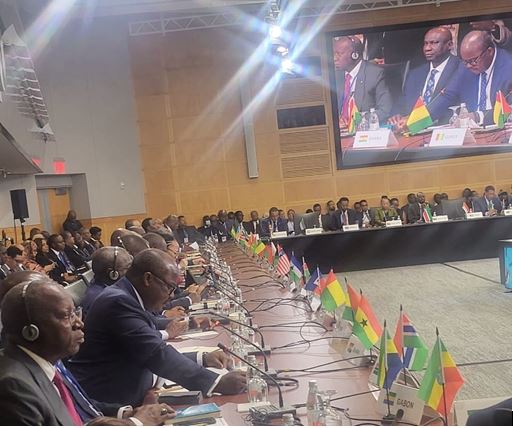Our Terms & Conditions | Our Privacy Policy
BoG Governor pushes for private sector support in G20’s debt relief efforts
 Dr. Ernest Addison, Governor-Bank of Ghana, at the October 2024 Africa Caucus Meeting
Dr. Ernest Addison, Governor-Bank of Ghana, at the October 2024 Africa Caucus Meeting
By Joshua Worlasi AMLANU, Washington DC
Dr. Ernest Addison, Governor-Bank of Ghana, has stressed the need for greater private sector involvement in the G20 Common Framework for Debt Treatments.
Speaking at the October 2024 Africa Caucus Meeting with the International Monetary Fund (IMF) Managing Director during the IMF/World Bank meetings in Washington DC, USA, Dr. Addison noted the importance of including private creditors to accelerate debt relief efforts and ensure equitable treatment for all creditors.
<! — Revive Adserver Asynchronous JS Tag – Generated with Revive Adserver v5.4.1 –>
<! — Revive Adserver Asynchronous JS Tag – Generated with Revive Adserver v5.4.1 –>
“The Global Sovereign Debt Roundtable (GSDR) should ensure swift, fair and effective debt resolution under or outside the G20 Common Framework, focusing on providing timely debt relief for the most vulnerable countries.
“At the same time, we call for greater private sector involvement in the common framework to ensure comparability of treatment and faster progress on debt resolution initiatives,” the Governor said.
The G20 Common Framework was established in 2020 to assist low-income countries facing unsustainable debt burdens, particularly those exacerbated by the COVID-19 pandemic. While it has focused primarily on restructuring official debts owed to sovereign nations, private sector creditors have largely been absent from the process.
Ghana successfully completed it’s Eurobond debt exchange programme, resulting in an exchange of about US$13billion in Eurobonds for new bonds.
This resulted in a debt reduction of 37 percent or US$5 billion, debt service relief of US$4.3 billion between 2023 and 2026, and interest rate reduction from over 8 percent to less than 5 percent. In essence, Ghana has now restructured over 90 percent of its eligible external debt.
The Eurobond debt exchange’s success follows successful completion of the Domestic Debt Exchange Programme (DDEP) in 2023, which involved restructuring about GH¢203billion of domestic debt and reaching an agreement with the Official Creditors Committee (OCC) on restructuring bilateral official debt of about US$5.1billion.
Addressing Africa’s debt crisis
Africa continues to grapple with a mounting debt burden. According to the African Development Bank (AfDB), over half of sub-Saharan African countries are either at high risk of debt distress or already experiencing it.
The AfDB has noted that Africa needs up to US$170billion annually for infrastructure, with a financing gap of up to US$108billion. The rising ratio of interest payments to revenue since the early 2010s has compromised investment in essential services.
Governor Addison noted that the pandemic, global inflationary pressures and geopolitical tensions have exacerbated the situation, pushing many African nations to the brink of fiscal instability.
This, he adds, has created a pressing need for swift and comprehensive debt restructuring to avoid a potential economic collapse in the region.
“Swift, fair and effective debt resolution under or outside the G20 Common Framework is essential to ensure timely debt relief for the most vulnerable countries,” Dr. Addison stressed.
He added that private sector involvement is critical to achieving comparability of treatment, a principle that ensures all creditors – both official and private – are treated equally during debt restructuring negotiations.

The comparability of treatment principle is designed to ensure that no single creditor group is disadvantaged in debt restructuring negotiations. Effectively, this prevents a scenario where official creditors, such as governments or multilateral institutions, provide debt relief while private creditors – such as commercial banks and bondholders – hold out for better terms or refuse to participate altogether.
“African economies need a fair process whereby all creditors, including private ones, contribute to solutions,” Dr. Addison said.
He pointed out that the inclusion of private creditors will not only ensure fairness but also expedite the restructuring process, which has often been hampered by lengthy negotiations and differing priorities between creditor groups.
Innovative financing solutions
In addition to advocating private sector involvement, Dr. Addison proposed innovative financing solutions such as debt-for-climate swaps, which could provide a win-win scenario for all parties involved.
These swaps allow countries to reduce their debt burdens in exchange for committing to climate-related projects, thus addressing both fiscal and environmental challenges simultaneously.
“Debt-for-climate swaps could be an effective way of bringing private creditors to the table, especially as the world increasingly prioritises climate action,” Dr. Addison said.
He pointed out that such mechanisms could also help African countries build resilience against climate change while addressing their debt vulnerabilities.
Images are for reference only.Images and contents gathered automatic from google or 3rd party sources.All rights on the images and contents are with their legal original owners.


Comments are closed.